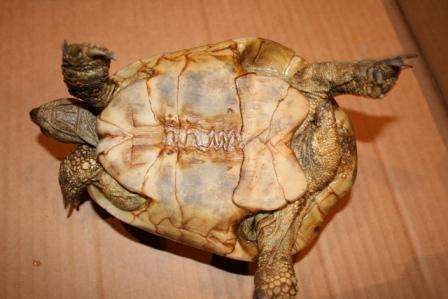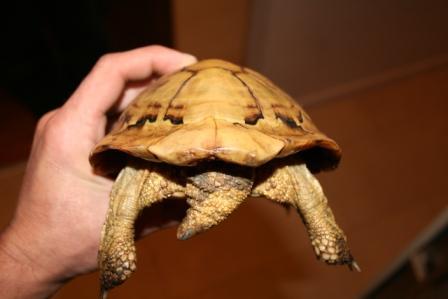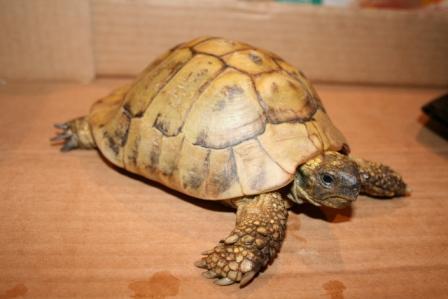You are using an out of date browser. It may not display this or other websites correctly.
You should upgrade or use an alternative browser.
You should upgrade or use an alternative browser.
Hypo Hermanns or just light coloured?
- Thread starter portsmouthtortoises
- Start date
- Status
- Not open for further replies.
marcel said:this is a tortoise hermanni of Greek origin.
I know a male identical to her, look photos
Thanks for your post, where are the pictures of the male?
sulley13 said:marcel said:this is a tortoise hermanni of Greek origin.
I know a male identical to her, look photos
Thanks for your post, where are the pictures of the male?
Never mind, they appeared just as i posted that.
sulley13 said:marcel said:this is a tortoise hermanni of Greek origin.
I know a male identical to her, look photos
Thanks for your post, where are the pictures of the male?
sulley13 said:marcel said:this is a tortoise hermanni of Greek origin.
I know a male identical to her, look photos
Thanks for your post, where are the pictures of the male?
Never mind, they appeared just as i posted that.
I'm a little awkward on the internet and also the English language.
I leave a link to a forum Spanish, tell the story of the male.
I've only seen these two specimens, the male comes from Meteora, Greece.
know the origin of the female?
thanks
http://foro.testudinae.com/472962/6761088-hola-algunas-dudas/
marcel said:sulley13 said:marcel said:this is a tortoise hermanni of Greek origin.
I know a male identical to her, look photos
Thanks for your post, where are the pictures of the male?
sulley13 said:marcel said:this is a tortoise hermanni of Greek origin.
I know a male identical to her, look photos
Thanks for your post, where are the pictures of the male?
Never mind, they appeared just as i posted that.
I'm a little awkward on the internet and also the English language.
I leave a link to a forum Spanish, tell the story of the male.
I've only seen these two specimens, the male comes from Meteora, Greece.
know the origin of the female?
thanks
http://foro.testudinae.com/472962/6761088-hola-algunas-dudas/
Well you're doing very well so far! I haven't seen another one as light coloured either which is why i am curious.
Unfortunately i don't know where she came from, she was given to us by an elderly man who couldn't care for her any longer. I would assume she is 40-50 years old.
She looks like an Iberian greek to me.
I know the pics you posted are a hermann. I am referring to the original post. She looks like an iberia to me. In fact i have one that looks identical. Ive never seen a lack of flared marginals on that specimen to be a hermanns. Im definitely no expert on testudo though.
tortadise said:I know the pics you posted are a hermann. I am referring to the original post. She looks like an iberia to me. In fact i have one that looks identical. Ive never seen a lack of flared marginals on that specimen to be a hermanns. Im definitely no expert on testudo though.
If it helps, she produces hatchlings and the father is hermanni boettgeri.
marcel said:the female is also hermanni boettgeri,
bad we can not pair these two elements ... hermanni golden ... wow
maybe we would not have to work anymore juassssss
and they would be happy
That would be something. I would be happy to do so.
We could have an even share of eggs.
- Joined
- Feb 27, 2009
- Messages
- 3,617
- Location (City and/or State)
- The Catskill Mountains of New York State
The tortoise is definitely an Eastern Hermann's, Testudo hermanni boettgeri. Examples lacking dark pigmentation are rare in captivity, but there are small populations of them in certain areas of their range.
Both the tortoises in the photos actually look like they may be very old tortoises whose colors have faded.
Both the tortoises in the photos actually look like they may be very old tortoises whose colors have faded.
GBtortoises said:The tortoise is definitely an Eastern Hermann's, Testudo hermanni boettgeri. Examples lacking dark pigmentation are rare in captivity, but there are small populations of them in certain areas of their range.
Both the tortoises in the photos actually look like they may be very old tortoises whose colors have faded.
Do you know the reasons as to why they lose dark pigmentation?
I have several other adults around the same age range which show no signs of fading.
not a matter of age discoloration.
I do not know the female original post, but I know the male.
He is so since first day, for at least 35 years, it was an adult 35 years ago.
the specimen is not mine, but I see him very often, because they really next from my family.
I do not know the female original post, but I know the male.
He is so since first day, for at least 35 years, it was an adult 35 years ago.
the specimen is not mine, but I see him very often, because they really next from my family.
- Joined
- Feb 27, 2009
- Messages
- 3,617
- Location (City and/or State)
- The Catskill Mountains of New York State
It's not unusual for Testudo species with a dark color over a light base to fade with age. Conversely, many tortoises that have a very dark base color will often lose a considerable amount of the lighter color over time. In general, many all fade with age even in captivity, when kept under outdoor conditions similar to that in the wild. Not to the same degree of change as they might in the wild.sulley13 said:GBtortoises said:The tortoise is definitely an Eastern Hermann's, Testudo hermanni boettgeri. Examples lacking dark pigmentation are rare in captivity, but there are small populations of them in certain areas of their range.
Both the tortoises in the photos actually look like they may be very old tortoises whose colors have faded.
Do you know the reasons as to why they lose dark pigmentation?
I have several other adults around the same age range which show no signs of fading.
I was also not implying that the tortoises in the photos faded considerably, only that they appeared to be older and have likely faded from their original coloration due to age. Both appear less vibrant in color than would a younger animal.
I do not have the books in front of me, but a couple of the European books on Hermann's have photos of wild Hermann's lacking almost complete coloration. Without looking it up, I do not recall the area of their range that these animals are found. They are however, very uncommon in captivity, at least here in the U.S.
GBtortoises said:It's not unusual for Testudo species with a dark color over a light base to fade with age. Conversely, many tortoises that have a very dark base color will often lose a considerable amount of the lighter color over time. In general, many all fade with age even in captivity, when kept under outdoor conditions similar to that in the wild. Not to the same degree of change as they might in the wild.sulley13 said:GBtortoises said:The tortoise is definitely an Eastern Hermann's, Testudo hermanni boettgeri. Examples lacking dark pigmentation are rare in captivity, but there are small populations of them in certain areas of their range.
Both the tortoises in the photos actually look like they may be very old tortoises whose colors have faded.
Do you know the reasons as to why they lose dark pigmentation?
I have several other adults around the same age range which show no signs of fading.
I was also not implying that the tortoises in the photos faded considerably, only that they appeared to be older and have likely faded from their original coloration due to age. Both appear less vibrant in color than would a younger animal.
I do not have the books in front of me, but a couple of the European books on Hermann's have photos of wild Hermann's lacking almost complete coloration. Without looking it up, I do not recall the area of their range that these animals are found. They are however, very uncommon in captivity, at least here in the U.S.
That could be possible as i think the owner that passed her on to us kept her in their garden all year round.
They are pretty uncommon here in the UK too, I haven't seen another one quite as light coloured.
So if she was born this colour and didn't fade, would this be a genetic trait that could be passed on?
- Joined
- Feb 27, 2009
- Messages
- 3,617
- Location (City and/or State)
- The Catskill Mountains of New York State
It is definitely a genetic trait. There are populations of "colorless" Eastern Hermann's in the wild. But very rare.
- Status
- Not open for further replies.
Similar threads
- Replies
- 2
- Views
- 1K




